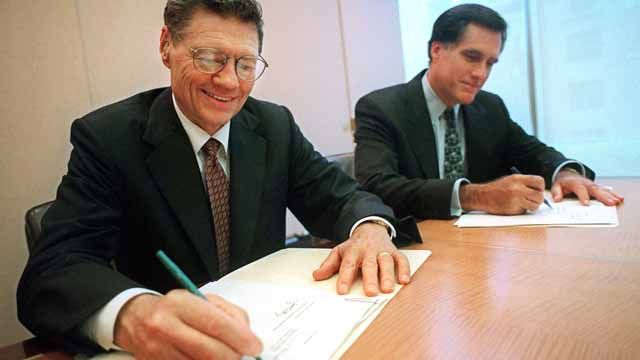Interesting how from very different directions the Occupy movement and now the debate raging among the Republican presidential candidates around Mitt Romney’s work at the private equity firm Bain Capital each have opened a public debate in the mainstream media over income inequality and the very nature of capitalism itself.

Back on November 11, Politico’s Dylan Byers reported, “A quick search of the news — including print articles, web stories and broadcast transcripts — via Nexis reveals a significant rise in the use of the term ‘income inequality,’ from less than 91 instances in the week before the occupation started to almost 500 instances last week.” That was an increase of more than 400 percent — and only a short time into the creation of the Zuccotti Park encampment.
Now, as Washington Post columnist E.J. Dionne writes:
Thanks to Mitt Romney and such well-known socialist intellectuals as Rick Perry and Newt Gingrich, the United States is about to have the big debate on the nature of modern capitalism that should have started back in 2008…
Romney’s central claim is that his business experience prepares him to be the nation’s great job creator. That message runs into some difficulty if he is seen instead as a job-destroyer. What if a certain class of capitalist makes scads of money not by building up companies but by tearing them down? What if there is a distinction between the capitalist we typically honor who comes up with a good product and hires people to make and market it; and another kind who takes over a company, pulls out all the cash he can, and then abandons it to die?
Dionne adds that Romney’s defense of his work as a venture capitalist is one of the few authentic parts of this year’s campaign:
He speaks with genuine passion when he accuses his conservative opponents of putting “free enterprise on trial.”
But that goes to the heart of the matter: “Free” for whom and under what circumstances? Capitalists of Romney’s sort never want to acknowledge how much their ability to make money depends on what government does. How does it structure the laws related to property, taxation and debt? What rules does it write on how companies can be acquired and how power within firms is apportioned among shareholders, employees, managers and other stakeholders? These are not natural laws. They are the work of politicians and the lobbyists who influence them.
The New York Times’ John Harwood writes in “A Blurring of the Lines in the Populist vs. Capitalist Debate” that when it comes to Washington and Wall Street, as Democrats defend government and Republicans extoll the free market:
[S]hifts in the political landscape have blurred some of those lines, potentially complicating the general election and Mr. Romney’s upcoming primary battles in South Carolina and Florida.
Democrats have made inroads in recent elections among affluent, well-educated voters. Mr. Obama’s 2008 campaign captured the majority of voters earning more than $200,000 and raised more than $90 million from the securities, finance, hedge fund and banking industries.
Republicans have bolstered their support among the sorts of middle and working-class voters who call themselves conservative Christians and identify with the Tea Party. And in 2008 Senator John McCain got more votes among whites earning less than $50,000 than Mr. Obama.
That’s why Mr. Romney’s approach might pose a risk. A Pew Research Center survey identified financially squeezed “disaffected” voters as a Republican-leaning constituency; just 21 percent of them agreed that “most corporations make a fair and reasonable profit.
Whatever your opinion, the fact that all of this is being talked about at all is fantastic — in every sense of the word. Not only remarkable but valuable and informative.

